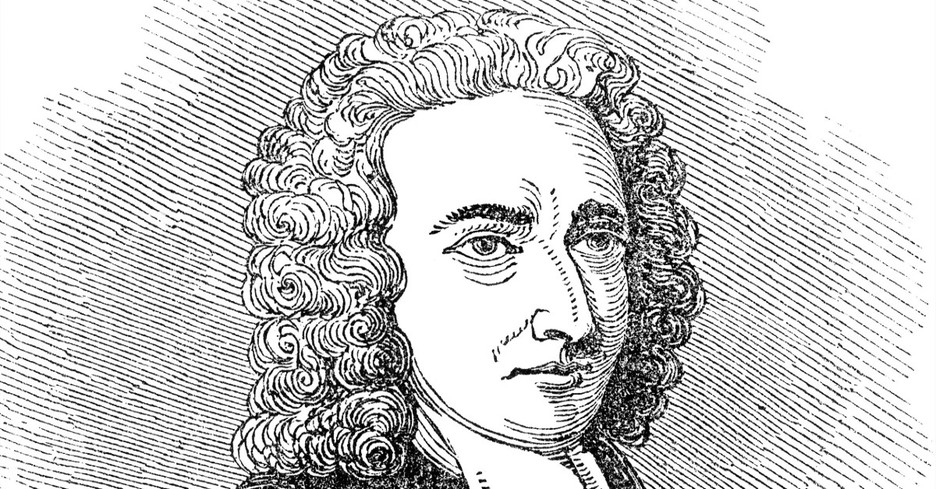
Pick up almost any modern hymnal, look in the index listing the composers of the hymns, and the name "Watts, Isaac" has a long list of hymns beside it. In his long life, Watts wrote over 600 hymns, and many of them continue to be used by English-speaking Christians to worship and praise the same Savior Watts loved and served.
Isaac was born July 27, 1674 at Southampton, England, the eldest of nine children. His father was a Dissenter from the Anglican Church and on at least one occasion was thrown in jail for not following the Church of England. Isaac followed his father's strongly biblical faith. Isaac was a very intelligent child who loved books and learned to read early. He began learning Latin at age four and went on to learn Greek, Hebrew, and French as well. From an early age Isaac had a propensity to rhyming, and often even his conversation was in rhyme. His father became quite annoyed at this and told him to stop. When the rhyming persisted, the father started to whip the boy, and little Isaac cried out:
"O father, do some pity take
And I will no more verses make."
When he was seven, Isaac wrote an acrostic poem on his name which reflected his theological training:
I am a vile polluted lump of earth
So I've continued ever since my birth;
Although Jehovah grace does give me,
As sure this monster Satan will deceive me.
Come therefore, Lord, from Satan's claws relieve me.
Because Isaac would not follow the national Church of England, he could not attend the Universities of Cambridge or Oxford. Instead, he attended an academy sponsored by Independent Christians. After completing his formal schooling, Watts spent five years as a tutor. During those years he began to devote himself more diligently than before to the study of the Scriptures. In 1707 he published his first edition of Hymns and Spiritual Songs.
Fever forces new direction
For a few years Watts served as an assistant and then pastor to an Independent congregation in London. A violent and continual fever from which he never recovered forced him to leave the pastorate. Sir Thomas Abney received Watts into his home, and Sir Thomas' family continued to provide a home and serve as Watts' patrons for the next 36 years!
Though naturally quick to resentment and anger, the Lord used Watts' sufferings to produce a gentle, modest, and charitable spirit. Out of his compassion, one-third of his small allowance was given to the poor. Watts' tenderness to children can be seen reflected in his lovely Divine Songs for Children, published in 1715.
Beholding the "brighter discoveries"
Watts' most published book was his Psalms of David, first published in 1719. In his poetic paraphrases of the psalms, Watts adapted the psalms for use by the Church and made David speak "the language of a Christian." Watts explained his method,
. . . Where the Psalmist describes religion by the fear of God, I have often joined faith and love to it. Where he speaks of the pardon of sin through the mercies of God, I have added the merits of a Savior. Where he talks of sacrificing goats or bullocks, I rather choose to mention the sacrifice of Christ, the lamb of God . . Where he promises abundance of wealth, honor, and long life, I have changed some of these typical blessings for grace, glory, and life eternal, which are brought to light by the Gospel, and promised in the New Testament. And I am fully satisfied, that more honor is done to our blessed Savior by speaking his name, his graces, his actions, in his own language, according to the brighter discoveries he hath now made, than by going back again to the Jewish forms of worship, and the language of types and figures.
Examples of Watts' method can be seen in his paraphrases of Psalm 72 into the hymn "Jesus Shall Reign Wher'er the Sun," Psalm 90 into "O God, Our Help in Ages Past," and Psalm 98 into "Joy to the World."
Many thanks, Ben!
Benjamin Franklin first published Watts' psalm paraphrases in America in 1729. Franklin was not the only American publisher to take an interest in Watt's hymns. In Boston his hymns were published in 1739. They were well-loved by Americans of the Revolutionary period.
Multi-talented man
Besides over 600 hymns, Watts published 52 other works, including a book of logic used in the universities, books on grammar, pedagogy, ethics, psychology, astronomy, geography, three volumes of sermons, and 29 treatises on theology. After his death on November 25, 1748, a monument to Watts was erected in Westminster Abbey. His greatest monument, however, are the hymns to his God still used by Christ's church. Why not look in your hymnal's index and notice how many familiar hymns were penned by the Father of English hymns?
Ugly Isaac
Though he had a beautiful soul, apparently Isaac Watts was not much to look at. He was frail and often sickly. His head seemed too large for his five foot tall body; his small, piercing eyes and hooked nose did not enhance his appearance any. A lady once fell in love with Isaac by reading his poetry and a correspondence ensued. When she met his face to face, however, she was very disillusioned, though he fell in love with her. He asked her to marry him, but her reply was, "Mr. Watts, I only wish I could admire the casket (jewelry box) as much as I admire the jewel." Watts never married, though the two remained good friends for over 30 years.
Revival aidsWatts' hymns gloried in the power, wisdom, and goodness of his majestic God. During the American revivals of 1735-1739, known as the Great Awakening, George Whitefield used Watts' hymns and songs in his meetings. |
Photo Credit: © Getty Images/denisk0


